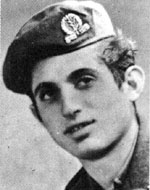Katz, Shmuel (“Shmulik”, “Catsin”)
Son of Avraham and Rachel. Was born on October 8, 1944 in Brody, Poland, but his father did not see him, because he was murdered by the Nazi enemy a few days before the liberation of the city. The mother raised her little girl until finally she managed to save both her soul and his soul. After a long journey of wandering and wandering and living in refugee camps, the family arrived in Israel in 1947, spent a short time in Tel Aviv and then came to Kibbutz Mishmar Ha’emek, where they were well absorbed and integrated into the life and lives of their friends. Although the family situation (the son’s orphanhood and the mother’s mental state) was not very good, Samuel grew up and had a healthy mind and was full of joy and great energy. When he was 12 years old, he decided to stay in the farm even after his mother moved to the city and completed his 12 years of education in Mishmar Ha’emek. Shmuel was accepted by his friends, always was at the center of everything that was happening in them and the kibbutz and even initiated social activities. He was always willing to help, filled positions with the children and youth, and became a mentor to his young apprentices. Soon he called the field of agriculture and after graduating he submitted a serious and valuable thesis on the subject of “Seed Cycle”. He was drafted into the IDF in November 1963 and volunteered for the Paratroopers Brigade, and after completing basic training, he took a platoon commander’s course and an officers’ course and taught two units in his unit until he was discharged with the rank of lieutenant. He was not only a good soldier but also an outstanding officer, a guide and a commander alike. In the army he would appear as a kibbutznik and associate the values of the kibbutz with those of the army. His soldiers saw him as a father and were willing to do anything for him. After his discharge from the army, he served for a year as a member of the kibbutz and trained the youth in the educational institution. Would love to travel in the country to know her well and this hobby also permeated his gums. His horizons were broad and the areas he was interested in were numerous – and there were also opposing, ostensibly, for example: he loved classical literature – and also modern; He liked Jewish and Hasidic folk songs and listened to jazz with enthusiasm – and with all this his attitude toward life was serious. From time to time he went to reserve duty and during the period of alert before the Six-Day War, when Shmuel was called to the flag together with all his friends, he joined the unit where he served as the commander of the sabotage department. On the second day of the battles, on the 27th of Iyar 5727 (June 6, 1967), when he took part in the break-in of the fortifications of Old Jerusalem in order to make his way to the force of the intruder, he died. On his way to paralyzing the air position, Shmuel was wounded by mortal wounds. Was laid to rest in the military cemetery on Mount Herzl in Jerusalem. After they fell, a pamphlet appeared in his memory and two more of his friends were remembered. The booklet “53 of them” published by Kibbutz Artzi in memory of their friends who fell in the Six Day War was devoted to a page of his history. The “Paratroopers ‘Aryeh” of the paratroopers’ headquarters was dedicated to his history and description of his last battle.
